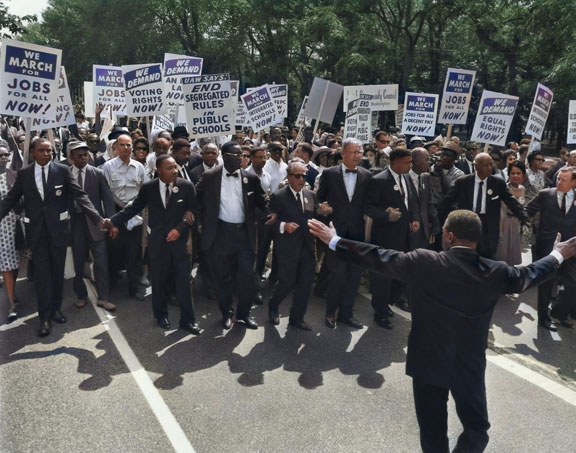“Even though we face the difficulties of today and tomorrow, I still have a dream. It is a dream deeply rooted in the American dream. I have a dream that one day this nation will rise up and live out the true meaning of its creed: We hold these truths to be self-evident, that all men are created equal.”
– Martin Luther King Jr
First proposed in 1979, Martin Luther King Jr. Day, or MLK Day, was eventually passed and signed into law in 1983. Although it did not take effect until three years later in 1986, the federal holiday is a celebration of the life and legacy of the man who challenged racial segregation and inequity in the United States. Dr. King was one of many who fought for the anti-discrimination laws we have today and believed in a brighter and more tolerant tomorrow.
Inspired by Gandhi’s ideals of nonviolence, Dr. King led and participated in sit-ins and marches with the aim of ending racial injustices. That included the 1963 “March on Washington” to protest civil rights abuses and employment discrimination. A crowd of about 250,000 people gathered peacefully on the National Mall in the nation’s capital where King delivered his most iconic speech, “I Have a Dream.”
The “March on Washington,” however, was not just a quick dream in the making. Decades earlier, American labor unions and civil rights activist Asa Philip Randolph first conceptualized a “march for jobs” to protest racial discrimination in the workplace, but that effort was stalled after the establishment of the Fair Employment Practice Committee (FEPC).
The FEPC was an executive order that banned discrimination in Defense Industries during World War II. Thanks to the persistence of Randolph and his fellow labor rights activists, President Roosevelt issued that order in 1941. But just five years later, the FEPC was dissolved, and Randolph looked to Dr. King for new inspiration.
When Randolph approached King about reviving his idea, he learned King and his Southern Christian Leadership Conference were already planning a “march for freedom.” So, the civil rights activists decided to combine their ideas, and the 1963 “March on Washington for Jobs and Freedom” was born.
A year later, in 1964, with Martin Luther King and other civil rights leaders in attendance, President Lyndon B. Johnson signed the Civil Rights Act into law. The bill authorized the federal government to prevent prejudice in employment and voting and declared that discrimination for any reason on the basis of race, color, religion, sex, or national origin was illegal in the United States.
For information regarding resources for employers, businesses and employees, connect with me on LinkedIn for new updates, or contact me here.
Experienced Employment Law Attorney, Mediator, Arbitrator, Investigator, Legal and Media Commentator
Twice-named a U.S. News Best Lawyer in America for employment and labor law, Angela Reddock-Wright is an employment and labor law attorney, mediator, arbitrator, and certified workplace and Title IX investigator (AWI-CH) in Los Angeles, CA. Known as the “Workplace Guru,” Angela is an influencer and leading authority on employment, workplace/HR, Title IX, hazing, and bullying issues.
Angela is a regular legal and media commentator and analyst and has appeared on such media outlets as Entertainment Tonight, Law and Crime with Brian Ross, Court TV, CNN, ABC, CBS, Fox 11 News, KTLA-5, the Black News Channel, Fox Soul – The Black Report, NPR, KPCC, Airtalk-89.3, KJLH Front Page with Dominique DiPrima, the New York Times, the Washington Post, the LA Times, Yahoo! Entertainment, People Magazine, Essence Magazine, the Los Angeles Sentinel, LA Focus, Daily Journal, Our Weekly and the Wave Newspapers.
Angela is a member of the panel of distinguished mediators and arbitrators with Judicate West, a California company that represents the gold standard in dispute resolution. She also owns her own dispute resolution law firm, the Reddock Law Group of Los Angeles, specializing in the mediation, arbitration, and investigation of employment discrimination, harassment, retaliation, and other workplace claims, along with Title IX, sexual assault, and misconduct, hazing and bullying cases.
For more information regarding resources for employers, businesses, and employees during this time, connect with Angela on LinkedIn for new updates, or contact her here.
This communication is not legal advice. It is educational only. For legal advice, consult with an experienced employment law attorney in your state or city.

